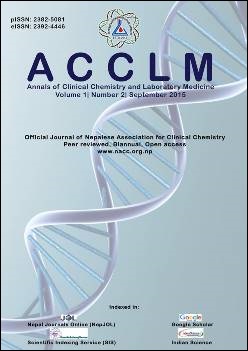Level of Serum Electrolytes in Chronic Alcoholic Patients
DOI:
https://doi.org/10.3126/acclm.v1i2.13330Keywords:
Alcoholism, hyponatremia, hypokalemiaAbstract
BACKGROUND: The aim of this study is to establish serum levels of sodium, potassium, magnesium, calcium and phosphorus in chronic alcoholic patients.
METHODS: This cross-sectional study was conducted in Tribhuvan University Teaching Hospital (TUTH). A total of 90 chronic alcoholic patients visiting to psychiatry department of TUTH were included in the study. Age of patients ranges from 20-50 years. Study also included 90 non-alcoholic healthy controls that were age matched.
RESULTS: Among the 90 chronic alcoholic patients and 90 normal healthy controls, majority of patients (95.5%) and controls (82%) were male, only few patients were female (4.5%). The mean age of the cases and controls were 35.42 ± 5.6 years, 34.53 ± 3.5 years respectively. In this study, the mean values of Serum Sodium and Potassium were lower in cases (133.58 ± 7.8, sodium and 3.64 ± 0.65, potassium) as compared to controls ( 139.43 ± 3.85, sodium and 4.15 ± 0.43, potassium) with the significant correlation in both groups (p<0.001). Calcium, phosphorus and magnesium level was depleted in cases compared to control groups.
CONCLUSIONS: Hyponatremia and hypokalemia are the most common electrolyte abnormalities observed in chronic alcoholic patients.
Downloads
Downloads
Published
How to Cite
Issue
Section
License
Authors who publish with this journal agree to the following terms:
- The author transfers copyright to the Nepalese Association for Clinical Chemistry.
- The journal publishes the work under a Creative Commons Attribution License that allows others to share the work with an acknowledgement of the work's authorship and initial publication in this journal and under the same share-alike license used here.
- Authors are able to enter into separate, additional contractual arrangements for the non-exclusive distribution of the journal's published version of the work (e.g., post it to an institutional repository or publish it in a book), with an acknowledgement of its initial publication in this journal.
- Authors are permitted and encouraged to post their work online (e.g., in institutional repositories or on their website) prior to and during the submission process, as it can lead to productive exchanges, as well as earlier and greater citation of published work (See The Effect of Open Access).




